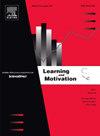英语学生对生成式人工智能(GAI)介导的教学在其情感投入和目标取向中的作用的认知:动机气候理论(MCT)视角的焦点研究
IF 1.8
4区 心理学
Q3 PSYCHOLOGY, BIOLOGICAL
引用次数: 0
摘要
在过去的几年里,关于生成式人工智能(GAI)技术对第二语言(L2)教育的贡献的研究激增。然而,关于人工智能介导的教学对研究生心理情感因素和英语作为外语(EFL)背景下整体学习氛围的影响的证据有限。为了解决这一差距,本研究利用动机气候理论(MCT)来探讨研究生英语学生对GAI技术在他们的情感投入和目标取向中的作用的看法。为此,采用最大变异抽样对30名研究生进行了访谈。归纳主题分析的结果表明,人工智能介导的教学对学生的情感投入和目标取向都有影响。特别是,研究发现,GAI工具通过“启发师生课堂关系”、“使整体课堂文化/氛围引人入胜、激励和更新”、“提高教师的行动、教学和反馈质量”、“提供个性化、互动性和自主性支持教育”以及“利用学习者的特定特质和个体差异”来促进情感参与。此外,GAI工具通过“促进对课程内容的掌握”、“设定个性化和可实现的目标”、“促进学生在课堂上的表现比较”和“提供反思和适应性学习环境”来影响学生的目标取向。本文对研究结果进行了讨论,并为英语教师、学生、教师教育者和政策制定者提供了关于GAI、情绪、目标取向和动机气候之间相互作用的启示。本文章由计算机程序翻译,如有差异,请以英文原文为准。
EFL students’ perceptions about the role of generative artificial intelligence (GAI)-mediated instruction in their emotional engagement and goal orientation: A motivational climate theory (MCT) perspective in focus
Research on the contributions of generative artificial intelligence (GAI) technologies to second language (L2) education has soared in the past couple of years. However, there is limited evidence pertaining to the impact of AI-mediated instruction on postgraduate students’ psycho-affective factors and the overall learning climate in English as a foreign language (EFL) context. To address this gap, the present study drew on motivational climate theory (MCT) to explore postgraduate EFL students’ perceptions of the role of GAI technologies in their emotional engagement and goal orientation. To do so, an interview was conducted with 30 postgraduate students using maximum variation sampling. The results of the inductive thematic analysis revealed that AI-mediated instruction had affected both the emotional engagement and goal orientation of the students. In particular, it was found that GAI tools fostered emotional engagement by ‘enlightening teacher-student classroom relationships’, ‘making the overall classroom culture/climate engaging, motivating, and updated’, ‘improving teachers’ action, instruction, and feedback quality’, ‘providing a personalized, interactive, and autonomy supporting education’, and ‘taping into learner-specific idiosyncrasies and individual differences’. Furthermore, GAI tools affected the students’ goal orientation by ‘facilitating the mastery of course content’, ‘setting personalized and achievable goals’, ‘fostering students’ performance comparison in the classroom’, and ‘providing a reflective and adaptive learning environment’. The findings are discussed and implications are provided for EFL teachers, students, teacher educators, and policymakers concerning the interplay of GAI, emotions, goal orientation, and motivational climate.
求助全文
通过发布文献求助,成功后即可免费获取论文全文。
去求助
来源期刊

Learning and Motivation
Multiple-
CiteScore
2.90
自引率
0.00%
发文量
53
期刊介绍:
Learning and Motivation features original experimental research devoted to the analysis of basic phenomena and mechanisms of learning, memory, and motivation. These studies, involving either animal or human subjects, examine behavioral, biological, and evolutionary influences on the learning and motivation processes, and often report on an integrated series of experiments that advance knowledge in this field. Theoretical papers and shorter reports are also considered.
 求助内容:
求助内容: 应助结果提醒方式:
应助结果提醒方式:


